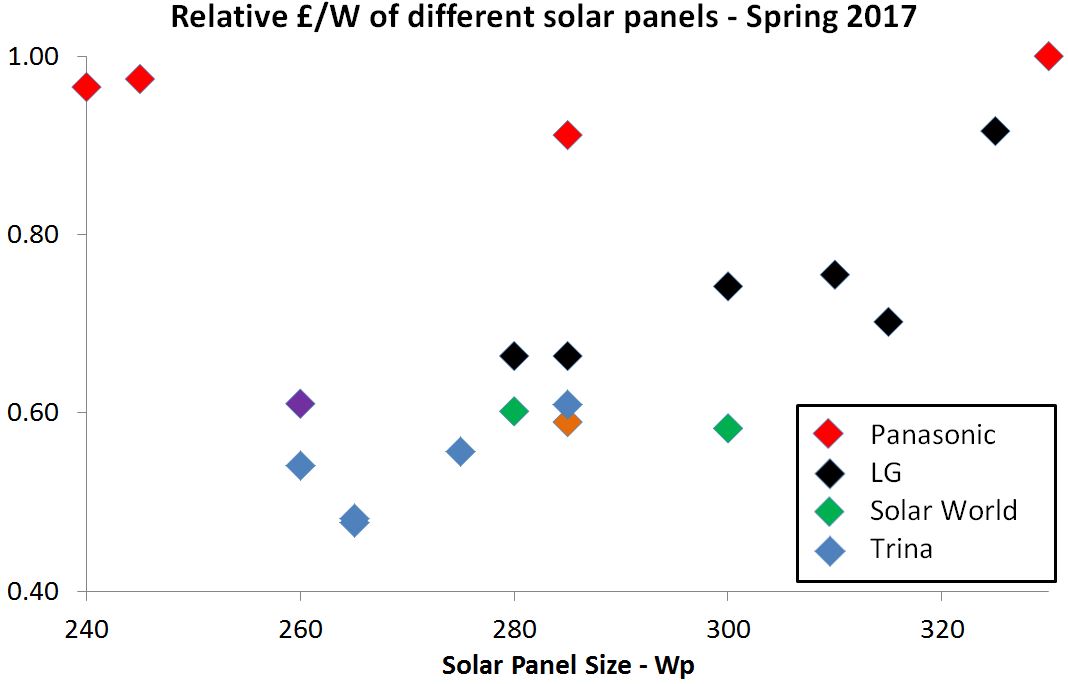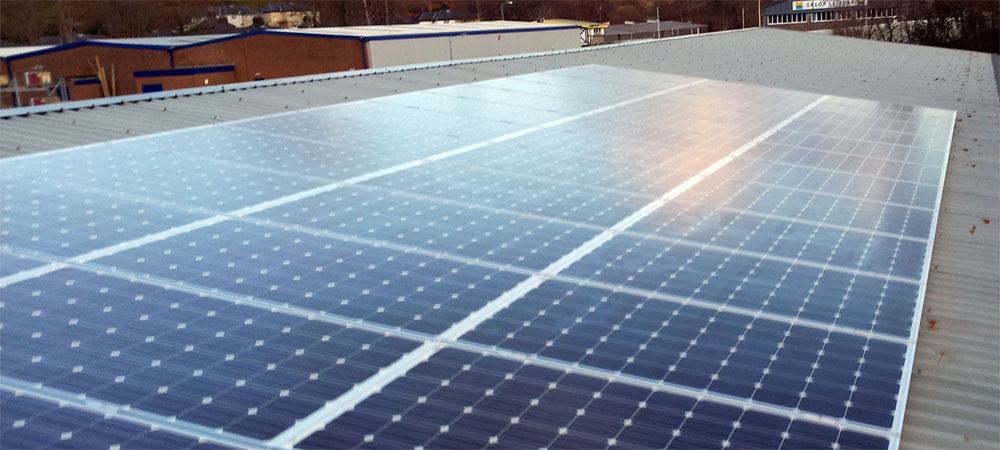Solar Panel Costs - The Definitive Guide
Solar Panel Costs - Introduction
- how much it costs to install a solar pv system
- how much it costs to buy an individual solar panel
- all the factors that affect costs in solar panel systems
or just want some general information about prices of solar panel systems you have come to the right place!
 Hello - My name is Owen Morgan and I run Exeo Energy. I know that it is hard to find transparent, up-to-date information on solar panel prices – so I have compiled for you, what I hope to be the most comprehensive guide to solar panel costs you will find online! If there is anything I fail to answer please feel free to contact me on o.morgan@exeoenergy.co.uk or via our contact form and let me know!
Hello - My name is Owen Morgan and I run Exeo Energy. I know that it is hard to find transparent, up-to-date information on solar panel prices – so I have compiled for you, what I hope to be the most comprehensive guide to solar panel costs you will find online! If there is anything I fail to answer please feel free to contact me on o.morgan@exeoenergy.co.uk or via our contact form and let me know!
How much do solar panels cost? - A Quick Summary
- The average price for a typical domestic solar panel system is around £5,750 inc 5% VAT – fully installed.
- Typical installation costs for a domestic grid-connect solar pv installation will range from around £3,500 to £7,500 including 5% VAT. This depends on various factors – detailed in the article below.
- Average price for an individual solar panel, as part of a grid-connect solar photovoltaic installation would be around £190 inc 5% VAT.
- The price for an installed solar panel system has dropped by around 75% over the past 10 years
- The price for solar photovoltaic cells has dropped by over 99% since 1977
- Installing solar panels will earn you money through the feed-in tariffs and also save you money on your electricity bill. You could be getting a 10% return on investment on your system.
- If you are based in or near Oxfordshire and would like an accurate quotation for installing solar panels please contact our experts today.
Note: Please bear in mind that this cost information is correct as of spring 2017 and based on a significant amount of factors and assumptions that may or may not be relevant to you and your property! We detail these in depth later on in this article so you that you have an idea of all the factors that will make a difference to the cost of your system.
If you need more in-detail, accurate information tailored specifically to your property please get in touch with our solar pv experts today.
Article contents
- Costs for typical domestic solar panel systems
- Comparing the costs of different sized solar pv systems
- Comparing the prices of different solar panels
- Factors that affect solar panel costs – The Complete List
- The historical cost of solar panels
Costs for a typical domestic solar panel system
With assumptions below
The costs below are estimates for typical domestic grid-connect solar photovoltaic systems of 4 kWp, 3 kWp and 2 kWp. These are typical system sizes that are installed on domestic properties.
| Available roof area | System size | No. of Panels | Sq. m | Approx System Cost | Approx. Annual Output | kg CO2 saved per year | Typical ROI | Profit over 20 years |
| Large | 4 kWp | 16 | 26.4 | £ 6,200 | 3,500 | 1,736 | 10 % | £ 6,200 |
| Medium | 3 kWp | 12 | 19.8 | £ 5,100 | 2,600 | 1,290 | 9 % | £ 4,100 |
| Small | 2 kWp | 8 | 13.2 | £ 4,400 | 1,700 | 843 | 7 % | £ 1,600 |
Summary of costs:
- Typical cost for a 4kWp system is £6,200
- Typical cost of for 3 kWp system is £5,100
- Typical cost for a 2 kWp system is £4,400
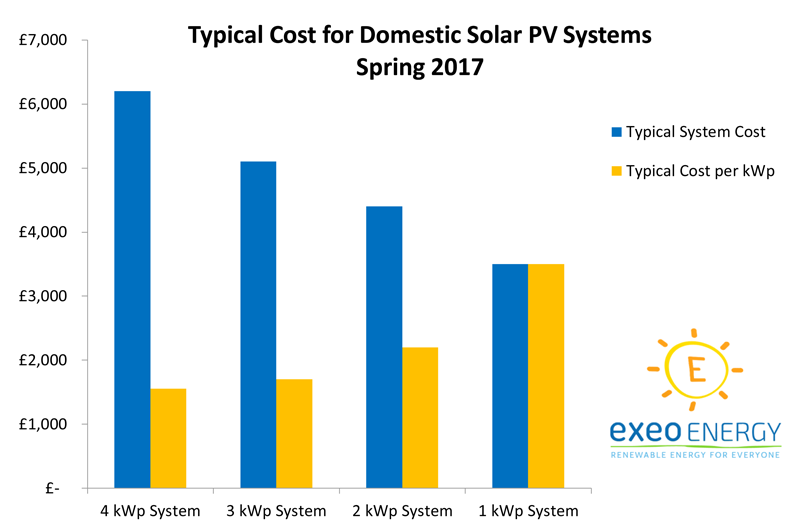
We have made the following assumptions for the above estimates:
- Scaffold will be required but will be straight forward
- Electrical work will be straight forward
- A 250 Wp, standard efficiency solar panel is used
- A standard string solar inverter is used
- The roof covering is concrete tile
- Installation would be a retro-fit using an on-roof mounting frame
- No additional options or extras have been included, for example immersion controllers or monitoring systems
- The solar panel installation will be in or near Oxfordshire
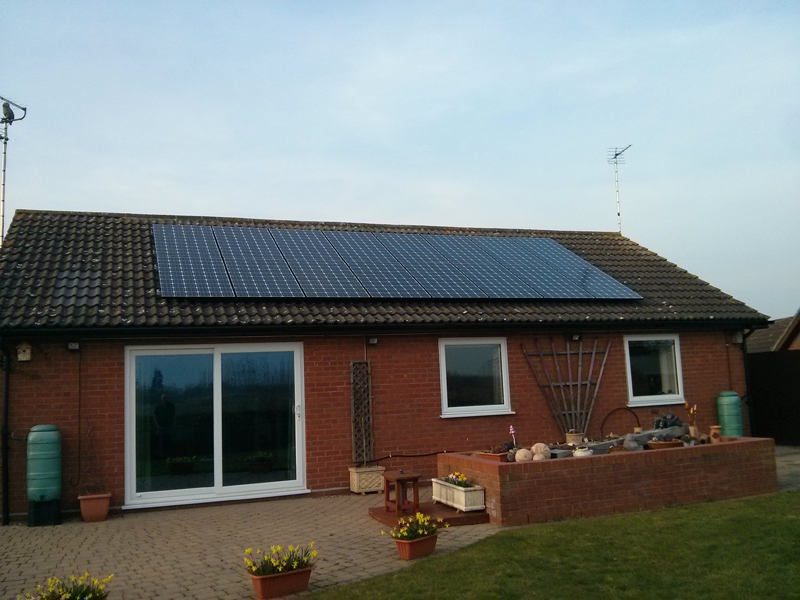
Comparing the prices of different solar panels
Factors that affect solar panel costs
The amount it costs to install solar panels will vary based on a large number of factors. If you are looking to install a grid-connect solar panel system on your home or commercial premises you will want to use a solar pv company that will provide you with a quote for a full system design, installation, all necessary components and good warranty cover for the years ahead.
You also want the company to be making a profit so that it can pay staff and is still around to look after your system in years to come! All of these factors need to be taken into account in a solar panels system costs.
Main factors that affect solar panel installation costs include:
- The size of the system
- The type and make of the solar panels
- The type and make of the inverter type
- Site specific issues like the complexity of the electrical work and requirement for scaffold
- Profit margin made by the solar panel installation company
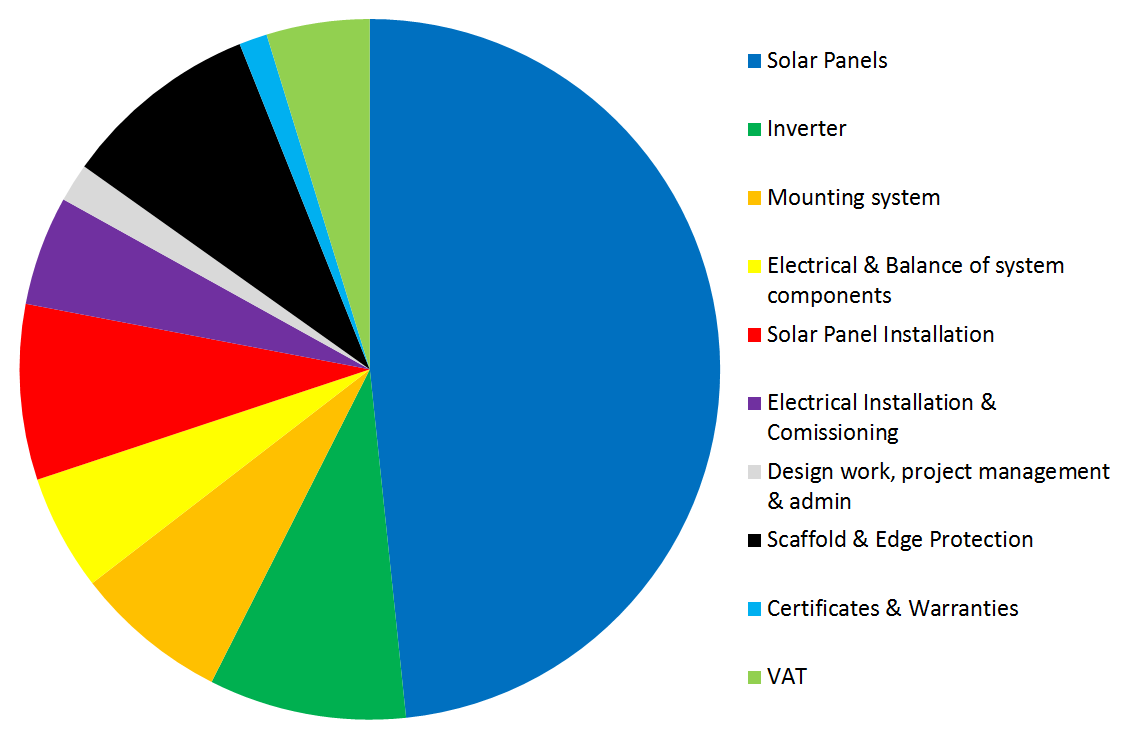
Cost weighting for a typical domestic solar pv system – The solar panels take up almost half the cost!
Factors that affect the cost of a solar panels system – The Complete List
We go into these items in more detail below.
Material costs – i.e. things that need to be bought
- The size of the solar pv system
- The solar panels
- The solar inverter
- The solar panel mounting frame
- The roof covering and the roof anchors used
- The complexity of the cable run
- Electrical bits'n'bobs
- Any 'extras' - For example solar immersion controller, advanced monitoring systems or solar battery storage systems
Service, Labour and other costs
- Scaffolding
- Solar panel installation labour
- Electrical installation & commissioning
- Certifications, warranties
- System design, administration, project management
- Profit for the solar panel company
- Unusual costs - For more bespoke systems there is sometimes a requirement for additional costs. For example additional design costs, additional cabling eg from a house to a garage or trenching for any ground works required.
- VAT
In Detail - Material costs – i.e. things that need to be bought
The size of the solar pv system - Normally restricted by available area, national grid limitations or budget. Obviously a large system is going to cost more than a small system! With high efficiency panels you can fit more kWp onto a restricted area than with standard efficiency panels but the cost per kWp will go up.
The solar panels – Top quality, high efficiency panels from a well know manufacturer are going to cost more than a standard efficiency, standard quality panel. The trick is finding a good quality, good value panel that matches your budget.
The solar inverter – Using power optimisers, micro inverters or a top brand like SMA will be more expensive than using a standard brand string inverter. Warranties play an important part in inverter choice and inverter cost too.
The solar panel mounting frame – Whether you choose an on-roof or an in-roof mounting system or you choose a solar roof tile will make a significant difference to the cost of the system.
The roof covering and the roof anchors used – There are different ways of fixing the solar panel mounting frame to the roof, and different roof coverings take more time and care to work with. For example installing roof anchors onto a slate roof is much more time consuming than installing roof anchors onto a concrete tile roof.
The complexity of the cable run – An AC cable needs to run from the inverter location to the consumer unit location. If the inverter is in a loft of a bungalow and the consumer unit is in a utility room below you can imagine that the material costs and time to run the cable will be low – leading to a lower cost. However if you imagine a three story Victorian town house with an awkward internal or external cable run to a consumer unit in a basement the material costs and labour costs become significant!
Electrical bits'n'bobs - Often referred to as BoS or Balance of Systems - Isolators, generation meter, cabling, circuit breakers, conduit and other electrical components. These are all required for every system. With an old fuse board the costs here would be higher than a modern fuse boards with plenty of spare ways. This does not constitute a major part of the overall cost but it is always there!
Any 'extras' - For example solar immersion controllers, advanced monitoring systems or solar battery storage systems. These will all add to the cost of the system, however they may result in a system that meets your specific needs better.
In Detail - Service, Labour and other costs
Scaffolding - Whether scaffolding is required or not can make a big difference to cost. Scaffold could easily be £500-600 and sometimes more.
Solar panel frame and solar panel installation labour – This goes back to the roof covering and roof anchors and how long the installation of the frame will take. A shallow pitched concrete roof with easy access will be much quicker than a steep pitched, slate roof with tricky access.
Electrical installation & commissioning –This goes back to the cable route and the condition of the existing consumer unit. Also the location of the inverter is important as an easy to access inverter, for example in a garage, next to the consumer unit, is going to be much quicker to install and commission than one installed down the far end of a loft with no boards or lights.
Certifications, warranties – All systems need to have MCS certificates, Electrical Certificates, EPC certificates, Building Regs certificates and warranty certificates. These all cost money and will all be taken into account in a solar panel costing sheet.
System design, administration, project management – Some companies treat this as an overhead that would need to come out of the profit of the job and some companies charge a fee as part of the installation. It does not really make any difference how it is accounted for, it all need to be done, and it all needs to be paid for!
Profit for the solar panel company – It might be a little controversial for us to talk about this so openly but let’s be clear, solar panel installation companies, like all other types of company have to be profitable. The profit on a job has to pay staff, overheads for accreditations, buildings, vehicles, site surveys etc. If you want a top quality installation you have to employ top quality people and top quality people cost money! You need a company that is going to be in business in years to come so that they can look after your system and help deal with any warranty issues.
Unusual costs - For more bespoke systems there is sometimes a requirement for additional costs. For example additional design costs, additional cabling e.g. from a house to a garage or barn or trenching for any ground works required.
VAT – This would be 0% for new builds, 5% for domestic installations or 20% for non-domestic installations.
Historical cost of solar panels
Although the costs have slowed right down over the past few years the cost of solar panels has reduced hugely over the past few decades as global manufacturing capacity and competition has grown significantly.
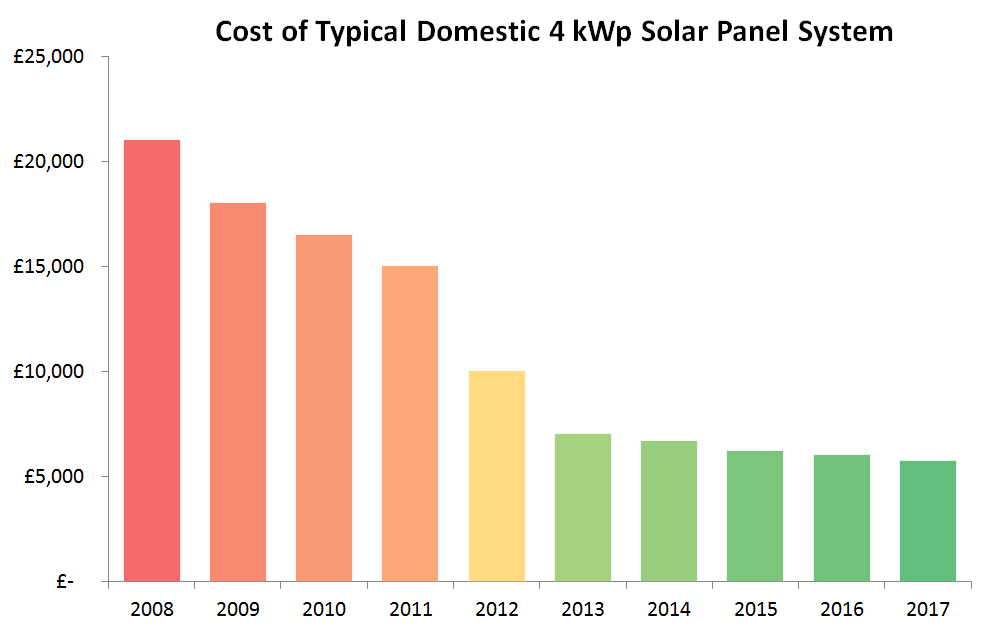
The longer term trends are even more obvious
![]()
Some useful information about this topic can also be found on the Energy Saving Trust website here.
